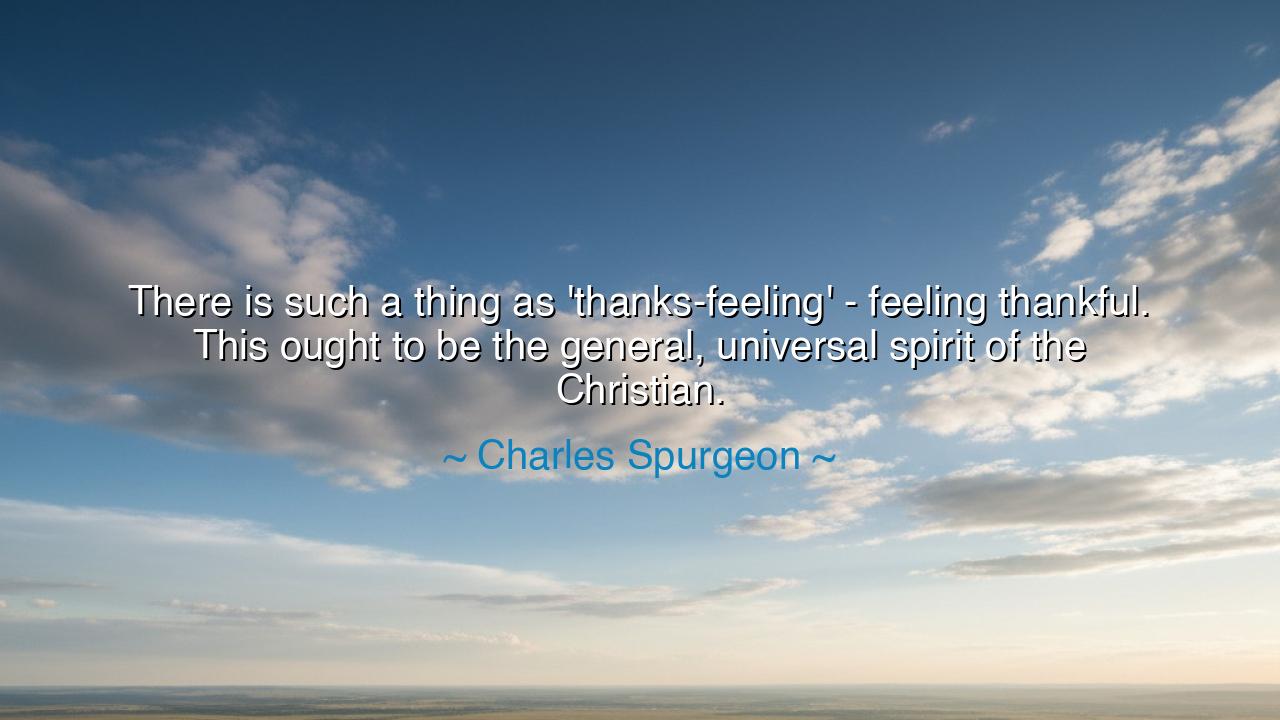
There is such a thing as 'thanks-feeling' - feeling thankful.
There is such a thing as 'thanks-feeling' - feeling thankful. This ought to be the general, universal spirit of the Christian.






Hear the words of Charles Spurgeon, the “Prince of Preachers,” who declared: “There is such a thing as ‘thanks-feeling’—feeling thankful. This ought to be the general, universal spirit of the Christian.” In this saying is a call not merely to offer words of gratitude, but to live in the spirit of it, to let thankfulness flow not from lips alone, but from the very depths of the heart. For gratitude that is spoken without being felt is but an echo; yet gratitude that is felt becomes a song that endures through all seasons of life.
The first truth in Spurgeon’s words is that gratitude is not only a duty but a state of being. To “feel thankful” is to let the soul be stirred by remembrance of blessings, even the smallest ones, until the heart cannot remain silent. The ancients themselves taught that the soul should be like a vessel overflowing with water: it spills not because it is commanded, but because it is full to the brim. So too should the Christian be filled with thanks-feeling, a gratitude that arises naturally, irresistibly, and continually.
The second flame is the universality of this spirit. Spurgeon speaks not to one class, not to the strong alone nor the prosperous alone, but to all. The universal spirit of the Christian, he says, ought to be gratitude. Whether in abundance or in want, in triumph or in trial, the Christian must find reason to give thanks. For gratitude does not deny sorrow—it redeems it. It does not erase hardship—it transforms it into testimony. In this way, thankfulness is not chained to circumstance but rooted in eternity.
History bears witness to this truth. Consider the story of Corrie ten Boom, who endured the horrors of the Nazi concentration camps. In those dark places, she and her sister Betsie chose to give thanks even for the fleas that infested their barracks, for the pests kept the guards away and allowed the women to worship in peace. Their thanks-feeling was not born from comfort, but from trust, and it sustained them in the valley of death. Such gratitude, deeply felt, reveals the power of Spurgeon’s teaching: it is a shield for the soul in times of despair.
The third jewel in this quote is the call to genuine experience rather than hollow ritual. Many recite prayers of thanksgiving as mere formality, their lips moving while their hearts remain unmoved. Spurgeon calls this a counterfeit, for true gratitude cannot be manufactured—it must be lived. To practice thanks-feeling is to awaken the senses to the daily mercies of God: the breath in the lungs, the warmth of companionship, the promise of redemption. It is to carry thankfulness not as a duty checked off, but as a melody that plays in the soul without ceasing.
The lesson for us is clear: to live as people of thanks-feeling is to walk through life with a spirit unshaken by fortune’s changes. When joy comes, we rejoice more fully because our hearts are trained in gratitude. When sorrow comes, we endure more bravely because we can still perceive mercy within the storm. In this way, gratitude becomes not just an act but an armor, not just a word but a way of being.
Practically, begin each day not only by naming what you are thankful for, but by pausing until you feel the gratitude stir within you. Let it move your spirit, let it soften your heart, let it turn complaints into prayers of thanksgiving. Practice noticing the hidden mercies—the interruptions, the delays, the disappointments—and seek within them the seeds of unseen blessings. And above all, let your gratitude not remain silent: express it to others, and let them be strengthened by your spirit.
Thus, Spurgeon’s words resound as an eternal teaching: gratitude must be felt, not just spoken; lived, not just professed. To cultivate “thanks-feeling” is to walk as a true Christian, bearing light in darkness, joy in trial, and humility in blessing. And in this way, the soul is not only preserved, but it becomes a fountain of hope for all who encounter it.






AAdministratorAdministrator
Welcome, honored guests. Please leave a comment, we will respond soon